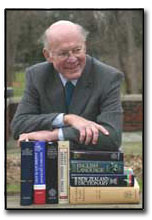
This web page is part of the Michigan Today Archive. To see this story in its original context, click here.
Okey-dokey, culture-vultures: echo away!Talking About WordsWith Prof. Richard W. BaileyEnglish is a language often without reason but seldom without rhyme. We like to make things echo, and we have lots of words that repeat the same syllable (or syllables) for no obvious good reason. (Our spelling of these words varies, and I will just stick in hyphens willy-nilly, whatever dictionaries may say.) In poetry, we like a little distance between the rhyme words. And we feel uncomfortable if moon rhymes with moon, though we are perfectly content that it rhyme with soon. In her lyric to "the largest city in west Michigan," the famous 19th-century "Sweet Singer of Michigan" Julia A. Moore rhymed rapid with Grand Rapids (where "Indian girls and boys were seen,/ With their bow and quiver,/ Riding in their light canoes/Up and down the river"). Readers, rightly enough, felt cheated by the rapid/Rapids rhyme, probably not reflecting on the fact that rapids doesn't have a rhyme word. Or not one that comes to mind. (In teaching poetry, I once declared that Ypsilanti had no rhyme word. "Black lace panty," shot back one of the students. "Something scanty," she said while my mouth still hung agape. I thought to myself, "Here, come up to the front and I'll hand over the chalk.") In the language of real life, we aren't so demanding of distance. There's nothing very strange in imagining girls popping bon-bons into their mouths and changing from their tu-tus to a frou-frou leotard designed for the pom-pon squad so they can encourage the rah-rah spirit with a choo-choo cheer against any opposing team that might want to pooh-pooh their school. English has two ways of representing the cry of the hyena: hau-hau and haunk-haunk. It may be that there are two dialects of hyena; or perhaps the creator of the second of these expressions had a better ear. Still, we like the parts of our animal cries to be just a little different: bow-wow , ki-yi, hee-haw. Sometimes these doublets involve animals in other ways: hippity-hoppity, roly-poly, silly-billy. Some have become metaphors and wandered a distance from the animals with which they began: culture-vulture, loosey-goosey. Most of them have one or two syllables: palsy-walsy, helter-skelter, harum-scarum, hoity-toity, mellow-yellow, mumbo-jumbo, namby-pamby, wishy-washy. An exception is higglety-pigglety with three. Many have the same vowel. If they have different vowels, the first one is almost always formed with the tongue higher and the second one lower: click-clack, jingle-jangle, wig-wag, wig-wam. Somehow it doesn't seem idiomatic to put the lower vowel before the higher: cross-criss, fare-fan, flop-flip, patter-pitter, pong-ping, tock-tick. Reversed, they sound uncomfortably strange. Almost always, the pairs have the same number of syllables, but if they don't, the second one usually has more than the first: phony-baloney . They're almost always informal or irreverent. Argy-bargy (mostly used in Great Britain) is a dispute that might lead to a curfuffle; it's related to argue and haggle. Achy-breaky (or herky-jerky ) heart is a lot less formal than, say, melancholia. Hoochy-cootchy dancing is, lexically, a far cry from ecdysiasm, though the words share the same denotation of a striptease. Rootin'-tootin' is a vivid synonym for animated; fuddy-duddy gets close to the semantic turf of valetudinarian. These echo words are often a lot more fun than their sober-sided synonyms. Shilly-shally, wishy-washy and dilly-dally are jollier than vacillate and a lot easier to spell than comme-çi, comme-ça. In answer to the question, "How are you?", "Fine" lacks the élan of hotsy-totsy. Hanky-panky suggests that the participants are at least having fun doing whatever it is they are doing. I've wondered, I must confess, about just what is accomplished by the Anchor-Yankers of our local Power Squadron. (They're what used to be called the "Ladies Auxiliary" of these organized motor-boaters.) In the English of India, these pairs are common. A party-warty might include glasses of whisky-pisky. The great dictionary of these Anglo-Indian expressions appeared in 1886. Its title was Hobson-Jobson, and its 21st-century successor is called Hanklyn-Janklyn. Some of these jingling words are, admittedly, dated. Tirra-lirra probably is recalled mainly because Tennyson's Sir Lancelot sang it by the river, or (with an additional lirra) as the refrain to the sentimental "Irish Lullaby." Tussie-mussie is some sort of Victorian nosegay, but in the 21st century we have, alas, less occasion for floral arrangements. Making words in these ways is still very much alive, however. Hip-hop as an expression has been around for a while, but the combo gained a whole new meaning with the flowering of hip-hop art forms. For the heroic work of virus busters, there are sites calling themselves hacker-smackers. A great variety of products have come to market as pocket-rockets, including small bicycles. All of this is, from a linguist's point of view, okely-dokely, okey-kadokey, okey-dokey.
|
|
Michigan Today News-e is a monthly electronic publication for alumni
and friends. |
| MToday NewsE | |||
|
Michigan Today
online alumni magazine
University Record
faculty & staff newspaper
MGoBlue
athletics
News Service
U-M news
Photo Services
U-M photography
University of Michigan
gateway
|
• Maps |
 Richard
W. Bailey is the Fred Newton Scott Collegiate Professor
of English. His most recent book is Rogue Scholar:
The Sinister Life and Celebrated Death of Edward H. Rulloff,
University of Michigan Press, 2003—a biography of an American
thief, impostor, murderer and would-be philologist who lived from
1821 to1871. It was published by the
Richard
W. Bailey is the Fred Newton Scott Collegiate Professor
of English. His most recent book is Rogue Scholar:
The Sinister Life and Celebrated Death of Edward H. Rulloff,
University of Michigan Press, 2003—a biography of an American
thief, impostor, murderer and would-be philologist who lived from
1821 to1871. It was published by the 